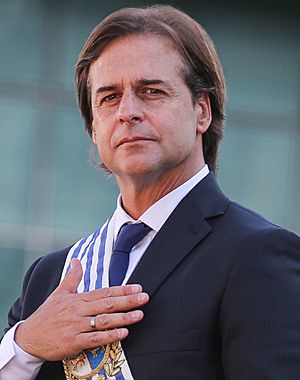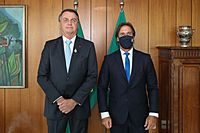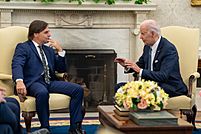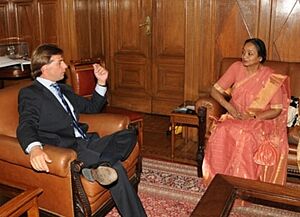Luis Lacalle Pou facts for kids
Quick facts for kids
Luis Lacalle Pou
|
|
|---|---|

Official portrait, 2020
|
|
| 42nd President of Uruguay | |
| In office 1 March 2020 – 1 March 2025 |
|
| Vice President | Beatriz Argimón |
| Preceded by | Tabaré Vázquez |
| Succeeded by | Yamandú Orsi |
| Senator of the Republic | |
| In office 15 February 2015 – 12 August 2019 |
|
| Constituency | At-large |
| President of the Chamber of Representatives | |
| In office 1 March 2011 – 1 March 2012 |
|
| Preceded by | Ivonne Passada |
| Succeeded by | Jorge Orrico |
| National Representative | |
| In office 15 February 2000 – 15 February 2015 |
|
| Constituency | Canelones |
| Personal details | |
| Born |
Luis Alberto Aparicio Alejandro Lacalle Pou
11 August 1973 Montevideo, Uruguay |
| Political party | National Party |
| Spouse |
Lorena Ponce de León
(m. 2000; div. 2024) |
| Children | 3 |
| Parents |
|
| Education | The British Schools |
| Alma mater | Catholic University of Uruguay |
| Signature | |
Luis Alberto Aparicio Alejandro Lacalle Pou (born 11 August 1973) is a Uruguayan politician and lawyer. He was the 42nd president of Uruguay from 2020 to 2025.
He is the son of former president Luis Alberto Lacalle. Lacalle Pou studied at The British Schools of Montevideo and became a lawyer in 1998. He is a member of the National Party.
He was first elected to the Chamber of Representatives in 1999. He served as a National Representative for the Canelones Department from 2000 to 2015. He also led the lower house of the General Assembly from 2011 to 2012. Later, he was a Senator from 2015 to 2019.
In 2019, he won the general election. He defeated Daniel Martínez and became President of Uruguay. At 46, he was the youngest president since 1985. His election ended 15 years of left-wing government in Uruguay.
During his time as president, Lacalle Pou made changes to retirement laws and the education system. He led Uruguay's efforts against the COVID-19 pandemic. His handling of the virus received high praise. In 2020, his government introduced a special law with many reforms. A referendum was held in 2022 to decide if parts of this law should be removed. The public voted to keep the law.
Some challenges during his presidency included a drought in 2023. This caused water shortages in the Montevideo metropolitan area. There were also some issues with people in his government, leading to resignations. After his presidency, Lacalle Pou became a candidate for the Senate in the 2024 general election. He could not run for president again because of a rule against serving two terms in a row.
Contents
Early Life and Education
Luis Lacalle Pou was born on 11 August 1973 in Montevideo, the capital city of Uruguay. He comes from a family with a history in government. His father, Luis Alberto Lacalle, was also a president. His mother, Julia Pou, was a former first lady and senator. He has two siblings, Pilar and Juan José. His great-grandfather, Luis Alberto de Herrera, was also an important political figure.
As a child, Lacalle Pou lived in the Pocitos neighborhood. When his father became president in 1990, his family moved to the Suárez presidential residence. When he was 14, he had a medical condition that affected his growth. He received treatment that helped him grow to 1.70 meters (about 5 feet 7 inches).
In his youth, he enjoyed surfing and played football for the Montevideo Cricket Club. He went to The British Schools of Montevideo. Even though his father was president, he preferred to drive himself to school in an old family car instead of using a government escort. In 1993, he started studying law at the Catholic University of Uruguay and finished his degree in 1998.
Political Journey
In the 1999 elections, Lacalle Pou was elected as a representative for Canelones. He served from 2000 to 2005. He was re-elected in 2004 and again in 2009, serving until 2015. He was part of the Herrerist group within the National Party, which was started by his great-grandfather.
In 2010, he ran for the leader of the Canelones Department but did not win. He led political groups known as lists 404 and 400.
Running for President
2014 Election
On 30 March 2014, Lacalle Pou announced he would run for president. On 1 June 2014, his party chose him as their candidate for the presidential elections. He was also elected as a Senator. He lost the presidential election in the second round on 30 November 2014.
2019 Election
In the 2019 primary elections, Lacalle Pou competed against several other candidates. He won with 53% of the votes. After winning, he announced Beatriz Argimón as his vice president candidate.
In the first round of the 2019 general election on 27 October 2019, he came in second place. Since no candidate won more than half the votes, a second round was held on 24 November. In this runoff election, Luis Lacalle Pou received 48.71% of the votes. His opponent, Daniel Martínez, received 47.51%.
The official results were announced on 29 November 2019. Lacalle Pou was confirmed as the winner with 48.8% of the votes, while Martínez had 47.3%. He was the first National Party candidate to win the presidency since his father left office in 1995. This was only the fourth time in 154 years that the National Party had been elected to lead the government.
President of Uruguay
| Presidential styles of Luis Lacalle Pou |
|
|---|---|
| Reference style | Señor Presidente. "Mr. President" |
| Alternative style | Presidente de la República. "President of the Republic" |
Taking Office
Lacalle Pou became president on 1 March 2020. After taking his oath, he rode with Vice President Beatriz Argimón in an old Ford V8 car. This car belonged to his great-grandfather. The parade ended in Plaza Independencia, where he received the presidential sash from the previous president, Tabaré Vázquez.
His government was formed by a group of five political parties. He promised to reduce government spending. He also wanted to make tax policies attractive to bring in wealthy people from other countries. Some people worried this might make Uruguay a "tax haven" again.
During his campaign, Lacalle Pou said he would introduce a package of new laws quickly. This is allowed by Uruguay's constitution. The coronavirus pandemic delayed this, but the bill was presented to Parliament on 23 April 2020.
Government Team
Lacalle Pou announced his cabinet (his team of ministers) on 16 December 2019. This team was made up of members from the different parties in his election alliance. He said his government would be one of "action" and would "talk a lot with the people."
|
|
|||
|---|---|---|---|
| Office | Name | Political party | Term |
| Ministry of National Defense | Javier García Duchini | National | 1 March 2020 – 4 March 2024 |
| Armando Castaingdebat | National | 4 March 2024 – 1 March 2025 | |
| Ministry of the Interior | Jorge Larrañaga | National | 1 March 2020 – 22 May 2021 |
| Luis Alberto Héber | National | 24 May 2021 – 4 November 2023 | |
| Nicolás Martinelli | National | 6 November 2023 – 1 March 2025 | |
| Ministry of Foreign Relations | Ernesto Talvi | Colorado | 1 March 2020 – 6 July 2020 |
| Francisco Bustillo | nonpartisan politician | 6 July 2020 – 1 November 2023 | |
| Omar Paganini | National | 6 November 2023 – 1 March 2025 | |
| Ministry of Economy and Finance | Azucena Arbeleche | National | 1 March 2020 – 1 March 2025 |
| Ministry of Education and Culture | Pablo Da Silveira | National | 1 March 2020 – 1 March 2025 |
| Ministry of Public Health | Daniel Salinas | Open Cabildo | 1 March 2020 – 13 March 2023 |
| Karina Rando | Open Cabildo | 13 March 2023 – 1 March 2025 | |
| Ministry of Social Development | Pablo Bartol | National | 1 March 2020 – 1 May 2021 |
| Martín Lema | National | 3 May 2021 – 4 March 2024 | |
| Alejandro Sciarra | National | 4 March 2024 – 1 March 2025 | |
| Ministry of Labour and Social Welfare | Pablo Mieres | Independent | 1 March 2020 – 1 March 2025 |
| Ministry of Transport and Public Works | Luis Alberto Héber | National | 1 March 2020 – 24 May 2021 |
| José Luis Falero | National | 25 May 2021 – 1 March 2025 | |
| Ministry of Livestock, Agriculture, and Fisheries | Carlos María Uriarte | Colorado | 1 March 2020 – 27 June 2021 |
| Fernando Mattos | Colorado | 27 June 2021 – 1 March 2025 | |
| Ministry of Industry, Energy and Mining | Omar Paganini | National | 1 March 2020 – 4 November 2023 |
| Elisa Faccio | National | 6 November 2023 – 1 March 2025 | |
| Ministry of Housing and Territorial Planning | Irene Moreira | Open Cabildo | 1 March 2020 – 5 May 2023 |
| Raúl Lozano Bonet | Open Cabildo | 9 May 2023 – 1 March 2025 | |
| Ministry of Tourism | Germán Cardoso | Colorado | 1 March 2020 – 22 March 2021 |
| Tabaré Viera | Colorado | 23 August 2021 – 11 March 2024 | |
| Eduardo Sanguinetti | Colorado | 11 March 2024 – 1 March 2025 | |
| Ministry of Environment | Adrián Peña | Colorado | 27 August 2020 – 30 January 2023 |
| Robert Bouvier | Colorado | 1 February 2023 – 1 March 2025 | |
| Secretariat of Sports | Sebastián Bauzá | National | 1 March 2020 – 1 March 2025 |
| Secretariat of the Presidency | Álvaro Delgado | National | 1 March 2020 – 21 December 2023 |
| Rodrigo Ferrés | National | 21 December 2023 – 1 March 2025 | |
| Deputy Secretariat of the Presidency | Rodrigo Ferrés | National | 1 March 2020 – 21 December 2023 |
| Mariana Cabrera | National | 21 December 2023 – 1 March 2025 | |
| Office of Planning and Budget | Isaac Alfie | Colorado | 1 March 2020 – 15 December 2023 |
| Fernando Blanco | National | 15 December 2023 – 1 March 2025 | |
Global Relations


When Lacalle Pou became president, Uruguay's relationships with other countries changed. He spoke out against the government in Venezuela. He also chose not to invite the leaders of Cuba and Nicaragua to his inauguration.
His government decided that Uruguay would leave the Union of South American Nations (UNASUR). They believed it had become too focused on one political idea. Uruguay also rejoined the Inter-American Treaty of Reciprocal Assistance (TIAR).
Lacalle Pou wanted to make the rules of the Southern Common Market (MERCOSUR) more flexible. He also suggested making the free trade area stronger. His government spoke out against the Russian invasion of Ukraine in 2022. During the Gaza war, he condemned the actions of Hamas. He also showed support for the people of Israel. Uruguay also asked to join the Trans-Pacific Partnership.
COVID-19 Response
The COVID-19 pandemic started soon after Lacalle Pou became president. The first cases were reported on 13 March 2020. He quickly asked for public events to be canceled and some places to close. People were advised to stay home, and schools were closed for two weeks. On 16 March, he ordered the closure of most border crossings.
Lacalle Pou chose not to enforce a full lockdown. He believed in "individual freedom." In April 2020, his government created a committee of experts to advise them. This group included important scientists like Fernando Paganini, Rafael Radi, and Henry Cohen.
At first, Uruguay's response was praised for keeping cases low. In early 2021, infections increased but then decreased by July. In January 2022, daily cases reached a peak before declining again.
2022 Referendum
In April 2020, Lacalle Pou's government introduced a special bill. This bill made changes in areas like the economy, public safety, and education. It was approved and became law on 9 July 2020.
Some groups, including a national trade union and the opposition party, disagreed with parts of the law. They started a campaign to collect signatures for a referendum. A referendum was held on 27 March 2022. Voters were asked if 135 articles of the law should be removed. The option to keep the articles won with 50% of the votes.
Personal Life
Lacalle Pou married Lorena Ponce de León in 2000. They have three children: Luis Alberto, Violeta, and Manuel. In May 2022, they announced their separation. Their divorce was finalized in June 2024.
Lacalle Pou loves surfing and has been doing it since the 1980s. He is also a big fan of rugby union. He supports his old school's alumni team and the national rugby team. He has even worn the national team's tie at public events.
See also
 In Spanish: Luis Lacalle Pou para niños
In Spanish: Luis Lacalle Pou para niños
- List of political families of Uruguay


